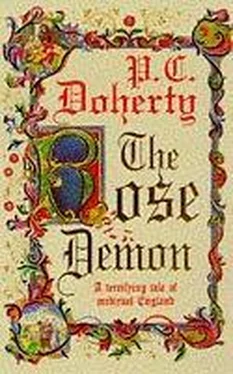Paul Doherty - The Rose Demon
Здесь есть возможность читать онлайн «Paul Doherty - The Rose Demon» весь текст электронной книги совершенно бесплатно (целиком полную версию без сокращений). В некоторых случаях можно слушать аудио, скачать через торрент в формате fb2 и присутствует краткое содержание. Жанр: Исторический детектив, на английском языке. Описание произведения, (предисловие) а так же отзывы посетителей доступны на портале библиотеки ЛибКат.
- Название:The Rose Demon
- Автор:
- Жанр:
- Год:неизвестен
- ISBN:нет данных
- Рейтинг книги:5 / 5. Голосов: 1
-
Избранное:Добавить в избранное
- Отзывы:
-
Ваша оценка:
- 100
- 1
- 2
- 3
- 4
- 5
The Rose Demon: краткое содержание, описание и аннотация
Предлагаем к чтению аннотацию, описание, краткое содержание или предисловие (зависит от того, что написал сам автор книги «The Rose Demon»). Если вы не нашли необходимую информацию о книге — напишите в комментариях, мы постараемся отыскать её.
The Rose Demon — читать онлайн бесплатно полную книгу (весь текст) целиком
Ниже представлен текст книги, разбитый по страницам. Система сохранения места последней прочитанной страницы, позволяет с удобством читать онлайн бесплатно книгу «The Rose Demon», без необходимости каждый раз заново искать на чём Вы остановились. Поставьте закладку, и сможете в любой момент перейти на страницу, на которой закончили чтение.
Интервал:
Закладка:
‘God help us!’ Vattier breathed. ‘There’s a farm burning out there. The bastards are coming!’
Vattier again sounded the war horn. The children stopped playing in the outer and inner baileys and were led away by their white-faced mothers. Soldiers tumbled out of their lodgings, fully armed. Vattier and Matthias went down to check the drawbridge was up and the portcullis down and locked. They continued their long vigil.
On the following day, just before noon, Matthias glimpsed small, dark figures on the horizon. At first they reminded him of ants creeping down a white-washed wall, just a few at first. Leaning over the battlements he strained his eyes against the whiteness of the landscape and made out horse and riders. He tried to calm the churning in his stomach. Within the hour there were more. Soon, a dark mass of horse and foot were moving slowly but inexorably towards the castle. They fanned out, reminding Matthias of the horns of a bull: on each wing, horsemen; men-at-arms in the centre; carts behind a dark, seething mass.
Every man stood to arms and, by late in the afternoon, the enemy had gathered across the frozen moat. They included mounted men-at-arms and a whole mass of lightly armed foot soldiers dressed in a motley collection of rags, braids and cloaks. Matthias recalled the Irish that had fought at East Stoke, with their rounded shields and long stabbing dirks. Slowly, the Scots force, under the brilliant banners of its commanders, fanned out along the moat and pitched camp. Tents and pavilions were set up: bothies made out of branches and pieces of wood, for the common soldiers. Fires were lit and Matthias caught the stench of burning meat. He also heard the faint cries and taunts of the enemy. Now and again, the lightly armed men would come down to the edge of the water to shriek insults in a tongue Matthias couldn’t understand.
‘They are well provisioned,’ Sir Humphrey remarked. ‘See the carts, Matthias. They would have left Scotland empty, but between here and the border lie solitary farms. These have been plundered for food, fodder for their horses, wood for their kindling. When they need more, they’ll simply send out foraging parties.’
‘But why here?’ Matthias asked. ‘Sir Humphrey, Barnwick is guarded by a gatehouse and walls, not to mention a stout garrison. The Scots have no siege weapons. All we have to do is sit here and wait.’
Sir Humphrey took his helmet off and scratched the back of his neck.
‘I know, Matthias. That’s bothering me.’ He crouched down and drew a line in the dirty snow. ‘These are the English defences along the Scottish march,’ he explained. ‘A line of strong castles, fortified garrisons. The Scots very rarely attack us because, as you say, that takes siege equipment. However, there’s always the chance the Scots may take one castle, punch a hole in the line of defence and continue south. They could do so quickly, ravage the lands in the south where they are least expected and then retreat back into Scotland before the Warden of the northern march can muster his levies.’
‘Why don’t they just go round us?’ Matthias asked.
‘That’s dangerous,’ Vattier broke in, helping Sir Humphrey back to his feet. ‘Once they pass us, we know where they are going. We can send warnings and, when the Scots return, the rest of the castles would amass a force and be waiting for them.’
Matthias looked down at the sprawling camp, listening to their faint cries, watching the flames of the fires grow stronger. The Scots had already set up picket lines, riders being despatched back from where they had come.
‘The other castles don’t know they are here,’ Sir Humphrey explained. ‘And, even if they did, they daren’t send for help.’ He gestured at the enemy. ‘This may only be a raiding party, more waiting further north, looking for one of the castles to weaken itself.’ Sir Humphrey leaned over the battlements. ‘I wonder what he wants?’
Matthias followed his gaze. A knight, his face hidden by a conical helmet, his great cloak flapping behind him, rode slowly down to the edge of the moat and stared up at the castle. He turned, raising one hand, and shouted. Six archers ran forward.
‘Oh, for the love of God!’ Vattier shouted. ‘Down!’
Sir Humphrey pushed Matthias beneath the crenellations. He heard a whirring noise which awoke nightmares from the battle of East Stoke: the arrows came flying over the battlements, smashing against stone or falling aimlessly into the bailey below.
Matthias peered over the battlements. The six archers, followed by the horseman, were now going back to the Scottish camp. Sir Humphrey clicked his fingers, told Matthias and Vattier to join him and went down to the gatehouse.
‘Now, that’s a surprise,’ Vattier grinned.
‘Yes, it is.’
Sir Humphrey stamped his foot, squeezing his nose, a common gesture whenever he was perplexed or worried.
‘I don’t understand it,’ he muttered. ‘First those Scots can no more break in here than I can fly. They can stay out there and rot till the Second Coming. Secondly, the Scots are not the best archers but they have master bowmen with them. Perhaps twenty, maybe even thirty?’
‘Longbows and arrows can’t take a castle,’ Matthias remarked.
‘No,’ Sir Humphrey sighed, ‘but they can divert us and make sure we keep our heads down. Vattier, let the men know.’
Despite Vattier’s warnings, the Scottish longbow men had some luck with their targets, the occasional sentry who forgot or was too rash. On the second day of the siege, one was killed, an arrow straight through his cheek: another was knocked off the parapet and later died of his injuries.
The mood in the castle grew sombre. The hard-packed earth in the cemetery was again dug up and sheeted corpses interred, a cross above them. Women and children wailed for the dead men. Sir Humphrey called constant meetings to discuss the situation: the Scots sat outside, waiting and watching.
‘Father is at a loss,’ Rosamund declared, as she and Matthias lay in bed one night. ‘He cannot understand what the Scots want: he wonders whether he should sally out and drive them off.’
Matthias could not agree. He spent hours in the gatehouse staring down at the Scottish camp. He reckoned their force outnumbered the garrison’s by at least three to one and, as Vattier said, what happened if there were others in the vicinity?
After the first week, days of frayed temper and sleepless nights, Sir Humphrey relaxed, poking fun at what the Scots intended.
‘There’s nothing we can do,’ he declared. ‘Just wait and see. Perhaps they’ll become tired and wander off elsewhere.’
Matthias wasn’t so sure. He felt a presentiment of danger, a silent threat or menace. He was uneasy whenever the two messengers, Deveraux and Bogodis, were in the vicinity. Work in the Chancery came to a standstill. Instead Matthias became more involved in the defence of the castle, going out at night to the sentries, taking great care when he peered over the battlements to ensure the Scots were not attempting some new strategy. On Candlemas Eve he had done such a duty. Then he returned to his own chamber, lit a candle and stared down where Rosamund was sleeping peacefully like a babe, her hands cupped under one cheek. He heard a knock on the door. Sir Humphrey came in. He glanced towards the bed and beckoned at Matthias, who grabbed his boots and followed him out into the gallery.
‘What is it?’ Matthias asked.
‘I don’t know.’ Sir Humphrey was clearly agitated.
Matthias put his boots on, wrapped his cloak round him and followed Sir Humphrey down the steps and across the inner bailey towards the keep.
‘Sir Humphrey, what is it?’ Matthias insisted, grabbing him by the arm.
Читать дальшеИнтервал:
Закладка:
Похожие книги на «The Rose Demon»
Представляем Вашему вниманию похожие книги на «The Rose Demon» списком для выбора. Мы отобрали схожую по названию и смыслу литературу в надежде предоставить читателям больше вариантов отыскать новые, интересные, ещё непрочитанные произведения.
Обсуждение, отзывы о книге «The Rose Demon» и просто собственные мнения читателей. Оставьте ваши комментарии, напишите, что Вы думаете о произведении, его смысле или главных героях. Укажите что конкретно понравилось, а что нет, и почему Вы так считаете.












